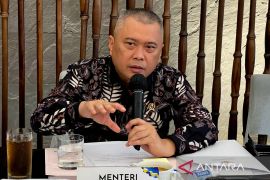We have sent a letter asking the bank to settle the problem well without hurting the customers and improve internal control and for the time being stop seeking Citigold customersJakarta (ANTARA News) - Citibank in Indonesia is biting the bullet as the Parliament and the banking authority have grilled it for alleged lax and questionable business practices.
"Citibank has been ordered to halt its expansion and new customer acquisitions for Citigold and its credit cards while waiting for a BI special inquiry into those two products," said Bank Indonesia (BI) spokesperson Difi A. Johansyah on Thursday (April 7).
The central bank`s announcement came a few hours after Emir Moeis, chairman of the House of Representatives Commission XI overseeing finance and banking affairs, called on BI to
subject Citibank to stiff penalties if it was found guilty in the death of one of its credit card customers, politician Irzen Octa.
Octa, secretary general of the Partai Pemersatu Bangsa (Nation Unification Party,) lost his life just a few steps away from Citibank-Indonesia`s head office in Jakarta on Tuesday, March 29, 2011. He had previously been questioned inside the building by three men hired by Citibank to collect his credit card debt.
The result of an autopsy on the remains of Octa announced on Friday (April 8) had identified cerebral hemorrhaging as the cause of death. The report, signed by Ade Firmansyah of University of Indonesia`s School of Medicine, said bleeding was found in the victim`s nose, the skull was bruised and the face was purple-colored.
At the same time, Citibank-Indonesia was also believed to be involved in money laundering, raking in dubious money from shadowy sources through its senior relations manager named Inong Melinda alias Melinda Dee. She was taken into police custody while a special police criminal investigation team was uncovering more deeply into her past dealings.
An avid collector of luxurious fast cars, Dee has been officially fired by Citibank after it was found she had skimmed at least Rp20 billion or roughly 2.5 million US dollars from the accounts of her priority customers. Police also confiscated the woman`s four glistening cars last week.
What is interesting, however, police have charged Dee with money laundering based on Law Number 8 of 2010 on Prevention and Eradication of Money Laundering. Even more interesting, Dee was tasked by Citibank to deal with its up-scale clientele, those who had deposited at least 500,000 US dollars.
Ruhut Sitompul, a member of the House of Representatives` Commission III that deals with legal affairs, said the assignment of premans (thugs) by banks and non-banking financial institutions for redeeming debts from clients does not have any legal basis within the Indonesian legal system.
Acknowledging that there are many recalcitrant debtors out there, the outspoken and former successful lawyer prior to his political career, Sitompul said that it was the right of the bank to recover its money. What is wrong, however, is the bank`s practice of resorting to shortcuts to this effect, using alleged thugs in the process.
Parliamentary wrath
For two subsequent days, Citibank regional representatives, including Shariq Mukhtar, found themselves in a parliament`s special hearing session with the House Commission XI. The hearing had really been eventful as some House members voiced their disappointment at the limit of their voice.
At one point, a House member yelled at them, saying Citibank has come to Indonesia not for business, rather for killing Indonesian people and embezzling their money. The wrath seemed to have particularly emerged from the fact that the victim, Irzen, was a fellow politician.
Arif Budimanta, another member of the Commission representing the opposition Partai Demokrasi Indonesia-Perjuangan (Indonesian Democratic Party - Struggle), even said that Citibank should leave Indonesia and "go to hell" if it found the country is not a prospective market.
As per March 2011, Citibank-Indonesia had 2.0 million credit card customers whereby it was controlling roughly 25 percent of the market.
"We want the strictest sanctions for Citibank. [Bank Indonesia] could freeze the bank`s credit card operation, or their [entire] operation in Indonesia, depending on the severity of their fault that will be proved before the law," said Moeis in the hearing.
Emir also called for an end to the common practice of banks involving third parties, such as alleged thugs, to redeem debt from clients. "We also want that, in the future, debt collectors not be outsourced but be an integral part of the bank, they have to be the bank`s employees," he said.
Emir added that the House would make sure Bank Indonesia implemented the recommendations.
"The House can take action by replacing all the central bank top officials who don`t follow up on this recommendation," Moeis said, signaling the political power Commission XI wields.
Commission XI is the organ of parliament that determines who can be appointed BI`s governor and deputies governor. "The bank governor also has to scrutinize his deputies and the directorate on bank supervision [as to] why [these incidents] could have happened," he pointed out.
Internal weakness
BI Governor Darmin Nasution that point-blankly has opined it was internal weakness that had brought about the problems plaguing Citibank-Indonesia. He also said if results of the investigation were more serious then BI could increase the sanctions.
"We have sent a letter asking the bank to settle the problem well without hurting the customers and improve internal control and for the time being stop seeking Citigold customers," Nasution said at the Wednesday hearing with House, explaining however that the ban was temporary while police investigation underway.
On the internal weakness, he said the case occurred because internal control was not implemented within Citibank as it had to be as shown by absence of supervision, rotation, dual control according to procedures and confirmation to customers.
Speaking on the first day of the two-day hearing on Tuesday, Nasution said a study conducted by BI on the embezzlement case had found three factors that might have caused the unscrupulous acts, including abuse of power committed by an employee of the bank and flaws in carrying out the standard operating procedures.
"There had been the absence of a check and recheck of transactions, and supervisors` weak control of employees," said Nasution, adding that the third factor had been customer negligence for trusting a signed transaction blank in the hands of bank employees to fill and giving away their ATM keys.(*)
Reporter: Edi Utama
Editor: Aditia Maruli Radja
Copyright © ANTARA 2011










